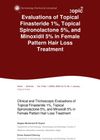 8 citations,
April 1988 in “Journal of endocrinological investigation”
8 citations,
April 1988 in “Journal of endocrinological investigation” Topical spironolactone cream doesn't cause hormone-related side effects in the body.
 2 citations,
September 1997 in “Journal of The European Academy of Dermatology and Venereology”
2 citations,
September 1997 in “Journal of The European Academy of Dermatology and Venereology” Topical spironolactone effectively treats hair loss in women.
 2 citations,
September 2023 in “Curēus”
2 citations,
September 2023 in “Curēus” Topical spironolactone may help treat ocular graft-versus-host disease with minimal side effects.
1 citations,
August 2022 in “Journal of Cosmetic Dermatology” Using both 5% spironolactone and 5% minoxidil together is safe and more effective for treating hair loss.
 1 citations,
June 2023 in “Cureus”
1 citations,
June 2023 in “Cureus” Spironolactone may help improve symptoms and tear quality in dry eye disease.
 August 2023 in “Journal of Cosmetic Dermatology”
August 2023 in “Journal of Cosmetic Dermatology” Both minoxidil-spironolactone and minoxidil-finasteride treatments work for hair loss, but minoxidil-spironolactone is slightly more effective, especially in women.
March 2023 in “Clinical, Cosmetic and Investigational Dermatology” Spironolactone can effectively treat hair loss with manageable side effects.
June 2020 in “The Medical Journal of Cairo University” Topical spironolactone works better than topical finasteride for hair loss.
 January 2025 in “Dermatology Practical & Conceptual”
January 2025 in “Dermatology Practical & Conceptual” Topical finasteride is as effective and safe as minoxidil for treating female pattern hair loss.
 10 citations,
December 2020 in “Dermatologic Therapy”
10 citations,
December 2020 in “Dermatologic Therapy” Minoxidil and spironolactone combo effectively treats androgenetic alopecia, improving hair density and diameter.
 December 2024 in “Pharmaceutics”
December 2024 in “Pharmaceutics” Spironolactone nano-formulations show promise for treating skin disorders, but more research is needed for safety and effectiveness.
November 2022 in “Al-Azhar International Medical Journal (Print)” Combining 5% spironolactone and 5% minoxidil is safe and more effective for treating hair loss.
 September 1997 in “Journal of The European Academy of Dermatology and Venereology”
September 1997 in “Journal of The European Academy of Dermatology and Venereology” Topical spironolactone effectively treats hair loss in women.
 22 citations,
January 2017 in “Dermatology”
22 citations,
January 2017 in “Dermatology” Spironolactone is effective and safe for treating acne with minimal side effects.
 18 citations,
May 2020 in “Biomolecules”
18 citations,
May 2020 in “Biomolecules” Spironolactone, a heart and liver drug, has new uses including cancer treatment, viral infection prevention, and skin condition improvement.
 July 2024 in “Forum Dermatologicum”
July 2024 in “Forum Dermatologicum” Topical treatments for hair loss can be effective but need careful safety evaluation.
 September 1997 in “JEADV. Journal of the European Academy of Dermatology and Venereology/Journal of the European Academy of Dermatology and Venereology”
September 1997 in “JEADV. Journal of the European Academy of Dermatology and Venereology/Journal of the European Academy of Dermatology and Venereology” The document concludes that treatments like oral anti-androgens, minoxidil, and topical spironolactone can be effective for hair loss in men and women.
 July 2023 in “Journal of exploratory research in pharmacology”
July 2023 in “Journal of exploratory research in pharmacology” A new psoriasis lotion called "Psorisbye" improved symptoms in a patient within one week.
 9 citations,
June 2021 in “International Journal of Pharmaceutics”
9 citations,
June 2021 in “International Journal of Pharmaceutics” Using polymeric micelles to deliver spironolactone topically could improve wound healing in skin affected by glucocorticoids.
 6 citations,
November 1993 in “Contact dermatitis”
6 citations,
November 1993 in “Contact dermatitis” Spironolactone in anti-acne cream can cause allergic skin reactions in some people.
 1 citations,
October 2022 in “Adolescent Health, Medicine and Therapeutics”
1 citations,
October 2022 in “Adolescent Health, Medicine and Therapeutics” Gender-affirming therapy can cause skin issues like acne and hair loss in transgender adolescents, and more research is needed on its dermatological effects.
 July 2011 in “Springer eBooks”
July 2011 in “Springer eBooks” The document concluded that FDA-approved treatments like minoxidil and finasteride are effective for hair loss, while the effectiveness of natural remedies and other non-approved treatments is not well-supported by evidence.

There are many treatments for common hair loss, but more trials are needed to decide which are best.
 January 2025 in “Dermatology and Therapy”
January 2025 in “Dermatology and Therapy” Hormonal therapies effectively treat acne and improve quality of life.
 101 citations,
January 1985 in “British Journal of Dermatology”
101 citations,
January 1985 in “British Journal of Dermatology” Spironolactone is effective for treating acne, hirsutism, and androgenic alopecia in women with few side effects.
 49 citations,
January 1994 in “The Journal of Steroid Biochemistry and Molecular Biology”
49 citations,
January 1994 in “The Journal of Steroid Biochemistry and Molecular Biology” RU 58841 may treat acne, hair loss, and excessive hair growth.
 16 citations,
January 1987 in “Dermatology”
16 citations,
January 1987 in “Dermatology” The spironolactone cream did not reduce hair growth in women with hirsutism.
 53 citations,
May 2010 in “PubMed”
53 citations,
May 2010 in “PubMed” Spironolactone helps regrow hair in women with hair loss.
 32 citations,
October 2003
32 citations,
October 2003 Spironolactone is better than placebo for reducing excessive hair growth in women, but its effectiveness for acne is unclear due to small study sizes.
 19 citations,
November 2011
19 citations,
November 2011 Using systemic drugs as creams for skin conditions shows promise, but more research is needed to confirm their effectiveness and safety.


























